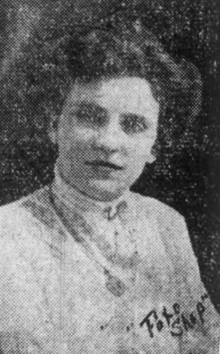Irene M. Giblin
Irene M. Giblin | |
|---|---|
 Irene Giblin, from a 1907 publication. | |
| Background information | |
| Born | December 8, 1888 St. Louis, Missouri, US |
| Died | December 5, 1974 St. Louis, Missouri, US |
| Genres | ragtime |
| Occupation | composer |
| Instrument | piano |
| Years active | 1905–1911 |
Irene Marie Giblin (August 12, 1888 – May 12, 1974), also known as Irene Giblin O'Brien, was an American pianist and composer of ragtime. She published a total of ten pieces between 1905 and 1911. Her song "Chicken Chowder" of 1905 was her biggest success.
Early life
[edit]Irene M. Giblin was born to Richard T. Giblin, a printer, and Nora Reardon Giblin in 1888, in St. Louis, Missouri. She was the eldest of six children.[1]
Music
[edit]Giblin was a popular young woman in the Irish-American community in St. Louis.[2][3][4] She worked at music stores Grand Leader and Stix, Baer and Fuller, playing the piano for several hours a day to convince the customers to buy the latest scores.[1][5]
Giblin published a total of ten ragtime songs over a period of six years, from 1905 to 1911.[6] Among them, "Sleepy Lou" and "The Aviator Rag" were popular sellers. However, it was her first rag, "Chicken Chowder" (1905)[7] that was her most successful.[8] She published her last rag in 1911, "The Dixie Rag".
Personal life
[edit]Giblin married Edward Patrick O'Brien, an accountant for the Missouri Pacific Railway Company, in 1908.[9] They had two sons: Richard in 1911 and Edward Jr. in 1915. Her husband died in 1958; Irene Giblin O'Brien died in 1974, at the age of 85 years, in St. Louis, Missouri.[1]
In 2018, the San Francisco Conservatory of Music marked the 150th birthday of Scott Joplin, along with the 130th birthdays of May Aufderheide and Irene Giblin, with a special concert of their works.[10]
List of compositions
[edit]
1905
- Quit, You're Kidding
- Chicken Chowder – Characteristic Two-Step
1906
- Sleepy Lou – A Raggy Two-Step
- Soap Suds – March Two-Step Characteristic
1908
- Black Feather – Two-Step
- Pickaninny Rag
1910
- The Aviator Rag
- Columbia Rag
- Ketchup Rag
1911
- The Dixie Rag
References
[edit]- ^ a b c Edwards, Bill. "Irene Mary Giblin O'Brien" RagPiano.com.
- ^ "135 Want to be Queen of Ball". St. Louis Post-Dispatch. June 23, 1907. p. 22. Retrieved July 21, 2019 – via Newspapers.com.
- ^ "St. Louis Girl Leads St. Patrick's Contest". St. Louis Globe-Democrat. June 17, 1907. p. 14. Retrieved July 21, 2019 – via Newspapers.com.
- ^ "Miss Mummert Entertains". St. Louis Post-Dispatch. August 25, 1907. p. 10. Retrieved July 21, 2019 – via Newspapers.com.
- ^ "Music Special Saturday (advertisement)". St. Louis Post-Dispatch. April 24, 1908. p. 3. Retrieved July 21, 2019 – via Newspapers.com.
- ^ Tjaden, Ted. Women Composers of Ragtime.
- ^ "Chicken chowder". Library of Congress. Retrieved 2019-07-21.
- ^ "OCRS gets Muck gallery ringing out with ragtime" Orange County Ragtime Society (April 2017).
- ^ "Society". St. Louis Globe-Democrat. September 11, 1908. p. 5. Retrieved July 21, 2019 – via Newspapers.com.
- ^ BWW News Desk. "San Francisco Conservatory Of Music Announces 2018-19 Season". Broadway World. Retrieved 2019-07-21.
